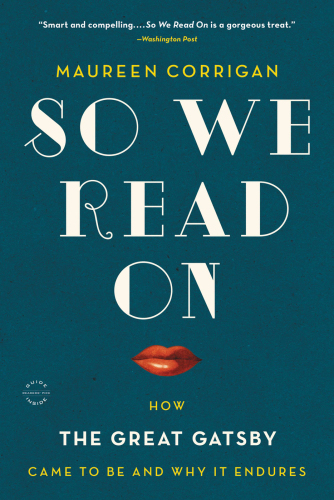
So We Read On
How The Great Gatsby Came to Be and Why It Endures
کتاب های مرتبط
- اطلاعات
- نقد و بررسی
- دیدگاه کاربران
نقد و بررسی

July 28, 2014
Mixing criticism with memoir, NPR book critic Corrigan (Leave Me Alone, I’m Reading) contends that F. Scott Fitzgerald’s Great American Novel is greater than we think. According to Corrigan, we were too young to appreciate The Great Gatsby when we read it in high school; we were dead to its themes of nostalgia and regret, overlooked its trenchant social critique, and mistook it for a love story. (Corrigan is adamant that we miss the point if we ask whether Daisy ever loved Gatsby.) To reintroduce and reassess a masterpiece, Corrigan visits the book’s Long Island setting, Fitzgerald’s grave, and a high school English class. Most illuminating, though, is her research into Gatsby’s reception: in the Library of Congress, she investigates how the novel, unheralded on its publication in 1925, became part of the canon by the 1960s. (Fitzgerald’s ghost can thank a few friendly critics and the paperbacks issued to GIs during WWII.) Today, Corrigan asserts, Gatsby still doesn’t get its due. When she laments that Fitzgerald is the subject of fewer college seminars than are his modernist cohorts, such as James Joyce, her partisanship may seem blinkered. She makes a good case, however, that our very familiarity with Gatsby’s Great American qualities has caused us to underrate it—and she does much to restore its stature. 13 b&w photos.

June 15, 2014
NPR book critic Corrigan (Leave Me Alone, I'm Reading: Finding and Losing Myself in Books, 2005) offers an occasionally self-indulgent but mostly spot-on reading of F. Scott Fitzgerald's greatest novel-and, according to some critics, the greatest novel in American literature.Those who know The Great Gatsby only through Baz Luhrmann's recent outing with Leonardo DiCaprio don't know the book at all, for, among other things, writes Corrigan, Luhrmann had a "larger project, I think, to defang the novel's class criticism." A fundamental uneasiness underlies Gatsby: As rich as the title character is, he can never make his way into the much more rarefied world of the Old Rich; as rich as he is, he cannot ward off fate, justice, karma and what Corrigan wisely calls "the Void." If Corrigan occasionally offers reading-group notes for the cashmere-sweater set-yes, Zelda was a loon; yes, Scott was a bad drunk; yes, Hemingway was an asshole-at other times, she's right on the case, turning up fascinating and sometimes-controversial gems: Could part of Gatsby's mystery lie in a mixed-race past? As to the race front, why is it that Fitzgerald has Tom Buchanan reading a book with the title The Rise of the Colored Empires, a book thinly modeled on one that Fitzgerald's own publisher had just released? There's much flowing under the surface of Fitzgerald's novel, and though Corrigan puts too much emphasis on herself and not enough on Jay and company ("I try to breathe deep and accept my powerlessness, as recommended by the on-line daily meditation program I sporadically log onto"), she does a good job of pointing out what we should be paying attention to, which goes far beyond billboards and chandeliers.Corrigan's close reading is welcome, though one hopes that readers will first revisit Fitzgerald's pages before dipping into hers.
COPYRIGHT(2014) Kirkus Reviews, ALL RIGHTS RESERVED.

Starred review from September 1, 2014
Book critic (NPR's Fresh Air), professor (literature, Georgetown Univ.), and author (Leave Me Alone, I'm Reading) Corrigan pens a literary love letter with this information-packed, entertaining volume. The object of her affection, F. Scott Fitzgerald's 1925 novel The Great Gatsby, is examined from many angles--literary, sociological, cultural, personal, and historical. The intrepid Corrigan reads and rereads the novel; offers insights into its tropes and meaning; visits dusty archives, graveyards, and even her Queens, NY, high school alma mater; pores over correspondence; and watches all manner of filmed and staged Gatsbys (including what she calls a "noir version") in order to get at the novel's message and its appeal. She traces the book's arc from creation to near-obscurity to literary prominence. Her tone is lively and bright and her enthusiasm for the novel is infectious. You'll feel as if you're attending a lecture by your favorite prof or chatting with a brainy, bookish friend. VERDICT Bursting with intellectual energy and fun facts, this paean to the "great American novel" will appeal to fans of Corrigan's book critiques and Jazz Age scholars, and will, one hopes, impel readers to pick up the brief work for the first (or fourth, or 14th) time. [See "Books for the Masses," Editors' BEA Picks, LJ 7/14, p. 28.]--Liz French, Library Journal
Copyright 2014 Library Journal, LLC Used with permission.

























دیدگاه کاربران